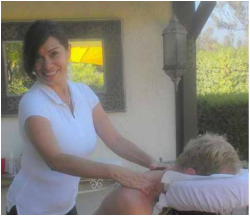What Is Reflexology?

A lot of people nowadays are getting to be enthusiastic about Reflexology. This is because it has been asserted to have a great deal of advantages, especially to people suffering from chronic illnesses such as diabetes and cancer. When you have ever gotten an ache or sore anyplace on your body, you might have felt the consequences of Reflexology, too. The therapy entails reflexology methods that focus on different regions of the face, including the skin, feet, and palms. A lot of men and women are thinking about the positive effects it might have for the overall wellness of the person getting it.
Reflexology is a classic Chinese medicine that concentrates on massaging the numerous organs in the foot and hand using reflexology tools. It's also referred to as Shiatsu, Japanese Shiatsu, and Thai Reflexology. Massage is not the one thing that Reflexology does, nevertheless. In fact, it's thought to be a complementary therapy to traditional Western medicine. Reflexology is also an alternate treatment that promotes healing by increasing the flow of blood, increasing the resistance of cells to injury, stimulating the lymphatic system, decreasing pain sensitivity, and increasing overall energy levels.
Reflexology has been known to deal with a number of ailments, both from a health perspective and by a relaxation perspective. For example, reflexologists are trained to find blocked energy pathways, which they can then clear throughout massage. There are many distinct types of reflexology techniques that professionals can use. Some are extremely easy, but some demand more complicated motions and places.

The most typical usage of reflexology is to relieve pain and cure a variety of ailments. Many patients that have chronic pain tend to be advised to take a massage. This helps to alleviate the tension that often goes along with chronic headaches, and it alleviates aches and pains also. People who suffer from migraines may also gain from a massage on a regular basis. Migraines are thought to be some of the toughest health issues to deal with. Again, this helps to relieve the pain and helps patients seek relief from their distinct health condition.
Among the most fascinating aspects of reflexology treatment is that it is totally safe. Practitioners say that their techniques are safe and gentle, particularly compared to invasive types of treatment. There are no cables involved, and there's not any risk involved with all sorts of anesthesia or pain-relieving medications either. Anyone, irrespective of age or physical capacity, can make the most of a brief course of Reflexology. The most essential qualification necessary is to allow you to be able to locate a certified and experienced Reflexologist in your area.
A large body of research has been conducted on its effects on overall wellness and well-being. In actuality, a variety of systematic reviews are done on this subject to appraise how it works and what its potential impacts may be. A range of systematic reviews have proven that reflexology might help people achieve or maintain optimal health. Some of these reviews have shown that individuals who've taken courses in Reflexology and Acupuncture, together with stress reduction methods and healthful eating and exercise, have been demonstrated to have a higher degree of health and self-esteem than those who didn't get treatment.
But, there is 1 problem with Reflexology and that is the fact that there isn't any proven medical evidence it is effective in preventing or treating any disease. It's generally acknowledged that a wonderful number of scientific research has become exploring how it works, but the outcomes aren't conclusive. Many professionals of Reflexology, for example Ayurvedic practitioners, consider that Reflexology may have an impact on recovery, particularly in reducing pain. But because there's yet to be some evidence that Reflexology does actually help in treating or preventing any disease, this theory remains subject to continuing debate.
There are a number of things which are thought when talking Reflexology. It's used as a holistic form of healthcare that incorporates all facets of natural medicine and also promotes regeneration by relieving pressure, relaxing and detoxifying the body. Many professionals think that the foot reflexology areas of the feet may offer significant clues to fix underlying difficulties. A number of other experts think there is simply not enough evidence to suggest that reflexology may have an impact on disease.
